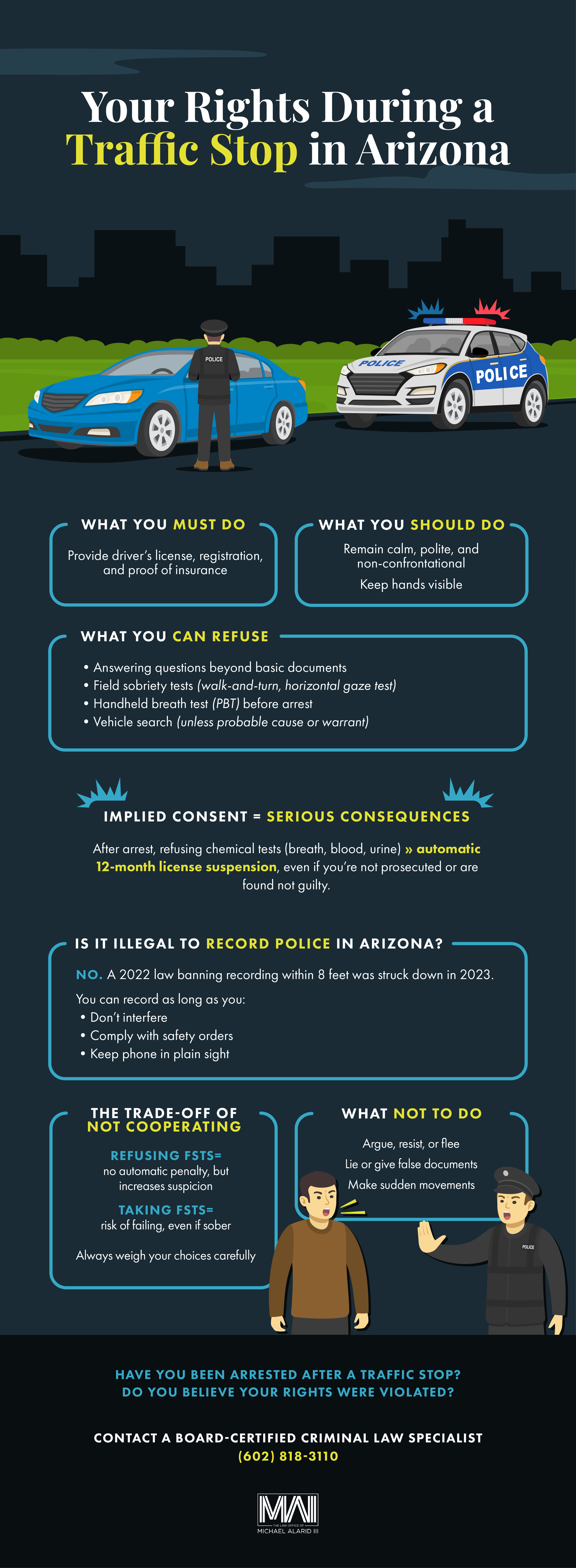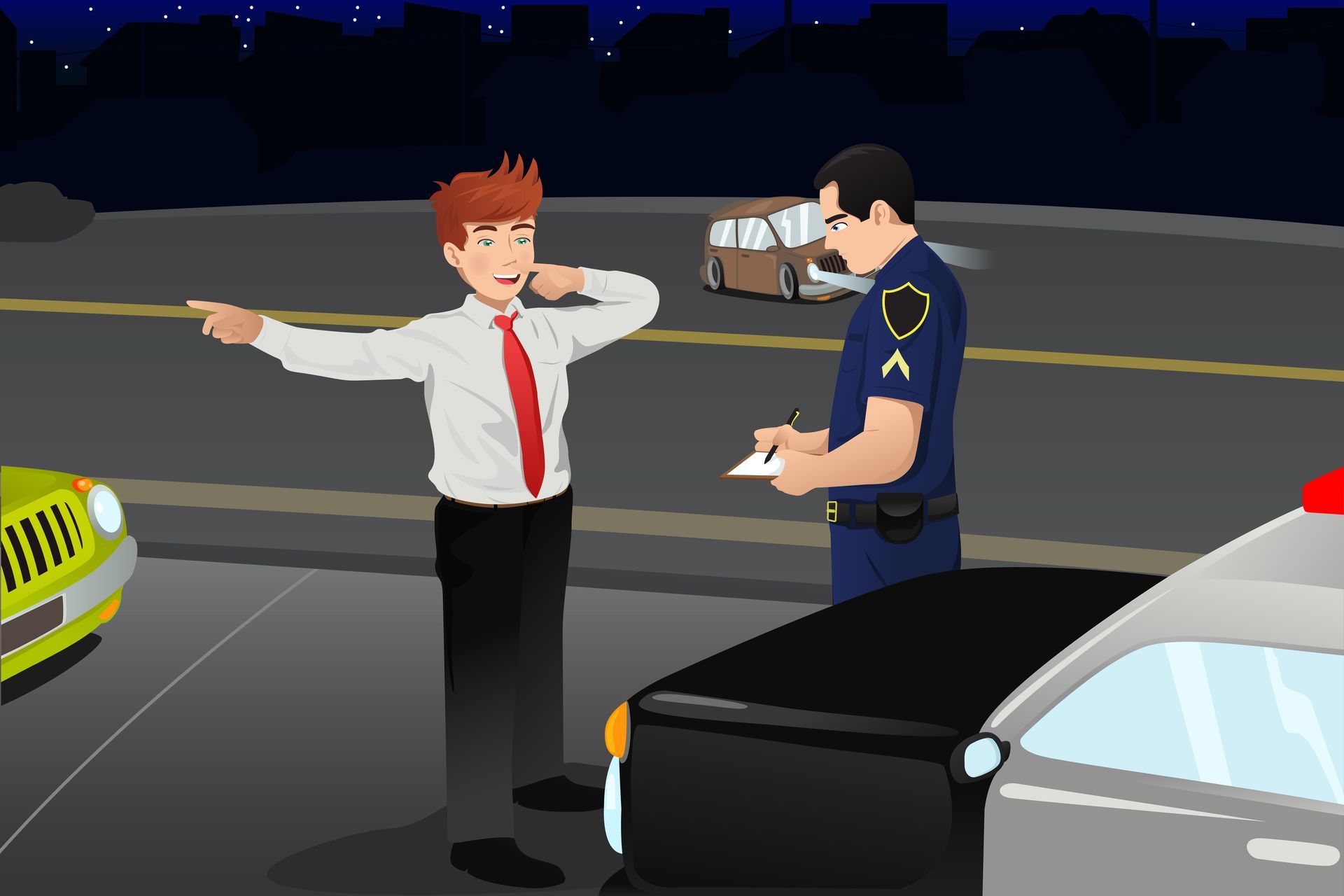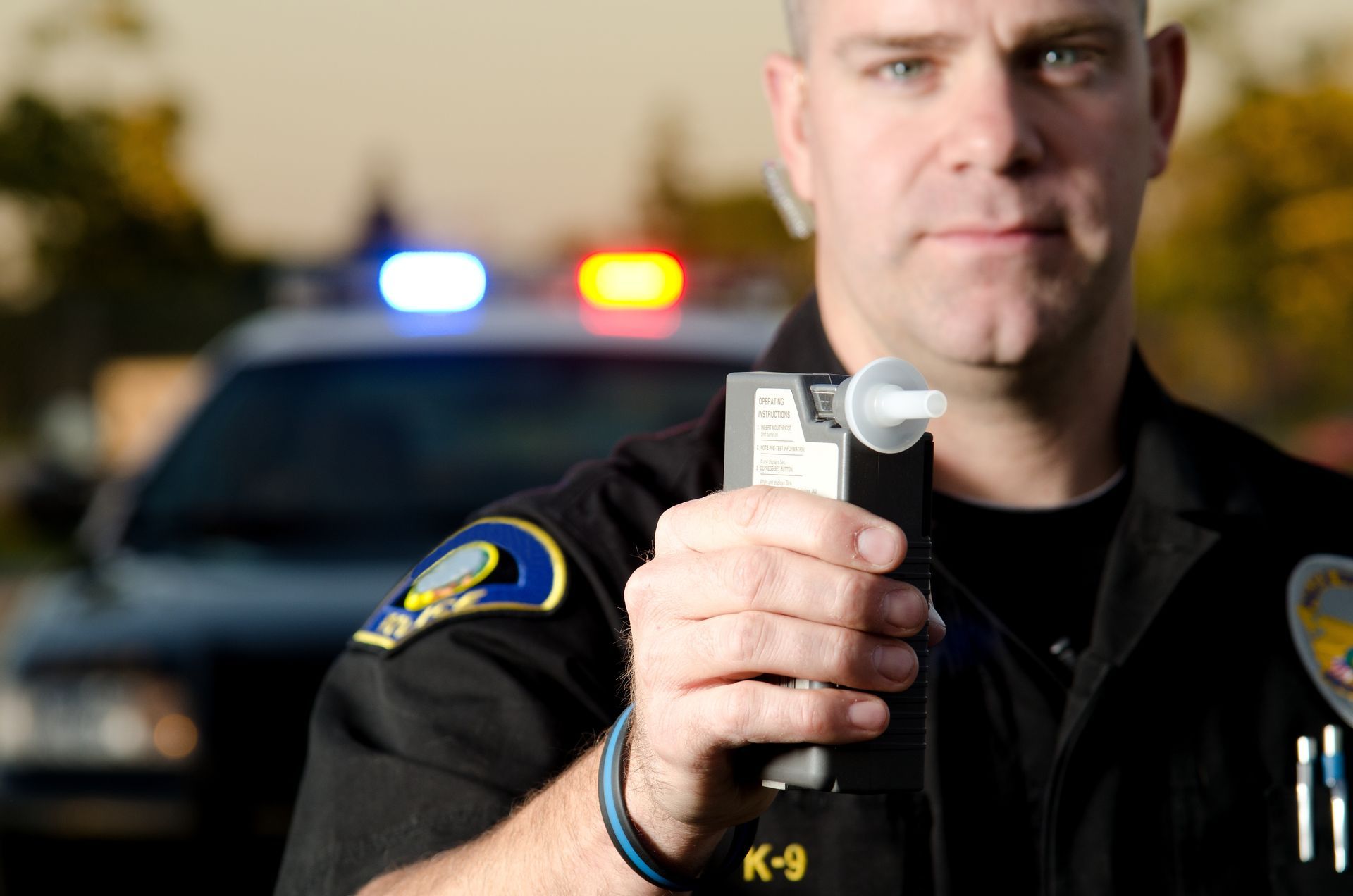Know Your Rights During a Traffic Stop in Arizona

Police officers have extensive experience manipulating drivers who aren’t fully aware of their rights. Law enforcement officers are not your attorney, and other than reciting your Miranda rights if you’re arrested, they are under no obligation to tell you what they are or are not allowed to do during a traffic stop. Drivers must be their own advocates, unless they are arrested, in which case they should request an attorney.
You Have the Right to Remain Silent
In Arizona, you are required to provide your driver’s license, vehicle registration, and proof of insurance when asked by an officer. Beyond that, you do not have to answer additional questions about where you’re coming from, where you’re going, or whether you’ve had anything to drink.
If you choose not to answer, it’s best to remain polite and calm. A simple statement like “I prefer not to answer any questions” makes it clear that you are asserting your legal rights, not being confrontational.
You Have the Right to Refuse a Search (With Limits)
Officers generally cannot search your vehicle without your consent or probable cause. That means you can say “I do not consent to any searches” if asked.
However, there are important exceptions:
- If officers see or
smell evidence of a crime (like open alcohol containers or the odor of marijuana), they may have probable cause to search.
- If you are arrested, they may search your vehicle after taking you into custody.
- If they have a search warrant for your vehicle, they do not need your consent to perform a search.
Being clear but respectful when refusing a search is key. If your vehicle is searched and officers find something incriminating, a criminal defense lawyer may still be able to challenge whether the search was legal and whether probable cause actually existed.
Isn't It Illegal to Record Police Officers in Arizona?
No, despite internet rumors to the contrary, it is legal to record police officers in Arizona.
In 2022, the Arizona legislature did pass a law that made it illegal to record law enforcement officers within 8 feet in certain situations. However, in July 2023, a federal judge struck down the law, ruling that it violated the First Amendment right to record public officials in public spaces.
This means that as of now, Arizona remains a one-party consent state, and you are allowed to record police during a traffic stop as long as:
- You are not interfering with law enforcement duties.
- You comply with lawful orders, such as stepping back for safety reasons.
- You avoid sudden movements or actions that could escalate tensions.
You are not required to tell officers you are recording, but keeping your phone in plain sight and calmly mentioning it can sometimes help avoid misunderstandings.
You Have the Right to Refuse Field Sobriety Tests, But There Will Be Serious Consequences for Refusing Breathalyzer or Chemical Tests After Being Arrested
Many drivers are surprised to learn that they can refuse roadside field sobriety tests, such as the walk-and-turn or horizontal gaze nystagmus (eye movement) test. There is no automatic license suspension or separate charge just for refusing them.
However, the officer can include the refusal in their report as part of their basis for probable cause to arrest you for DUI, and a prosecutor may argue at trial that refusal indicates consciousness of guilt.
You can also refuse a preliminary breath test (PBT) at the roadside without automatic penalties, but refusing can increase the officer’s suspicion and may contribute to probable cause for arrest. If you are arrested on suspicion of DUI, Arizona’s implied consent law goes into effect:
- You are deemed to have already consented to a chemical test (such as a breath, blood, or urine test) at the station or medical facility.
- Refusing this post-arrest test can result in a 12-month administrative license suspension, even if you are later found not guilty in court.
In short, you can refuse roadside tests without automatic penalties, but refusing an official chemical test after arrest comes with an automatic license suspension, regardless of your sobriety.
Consequences of Not Cooperating: The Trade-Off
It’s important to understand that while you have the right to remain silent, refuse searches, and decline field sobriety tests, not cooperating can still have trade-offs. For example:
- Officers may detain you longer to investigate.
- They may arrest you based on suspicion if they feel they have enough evidence without your cooperation.
- Refusing post-arrest chemical tests will almost certainly trigger an admin per se license suspension, even if you later avoid conviction.
Field sobriety tests are notoriously subjective, and many sober people fail them. Taking the test could provide evidence against you even if you’re sober, but refusing can increase suspicion and lead to arrest anyway.
Asserting your rights is always legal, but remember that how you do it matters. Staying calm and polite won’t negatively affect your situation, and it might make the encounter go more smoothly.
You Have the Right to Ask if You’re Free to Go
If you’re unsure whether you are being detained or are free to leave, you can always ask: “Am I free to go?” Officers must have reasonable suspicion to continue detaining you. If they do not, you are allowed to leave.
You Have the Right to a Lawyer if Arrested
If you are arrested, you should immediately ask for an attorney and stop answering any questions. Even if you believe you can explain yourself or clear up a misunderstanding, anything you say can be used against you.
Ask for a lawyer, and wait to speak with legal counsel before making any statements.
What You Should NOT Do
Even when you’re asserting your rights, certain actions can get you into serious trouble:
- Try not to argue or be verbally combative.
- Do not resist or flee.
- Do not lie or provide false documents.
- Do not make sudden movements, especially near the glove compartment or under the seat.
The safest approach is to keep your hands visible, stay calm, and clearly but politely assert your rights.
Get Legal Help if You Believe Your Rights Were Violated During a Traffic Stop in the Phoenix Area
If you were arrested or believe your rights were violated during a traffic stop in Arizona, call Board-Certified Criminal Law Specialist Michael Alarid III at (602) 818-3110. He has extensive experience challenging field sobriety test results, probable cause of stops, and a variety of other common strategies law enforcement officers use during traffic stops.




